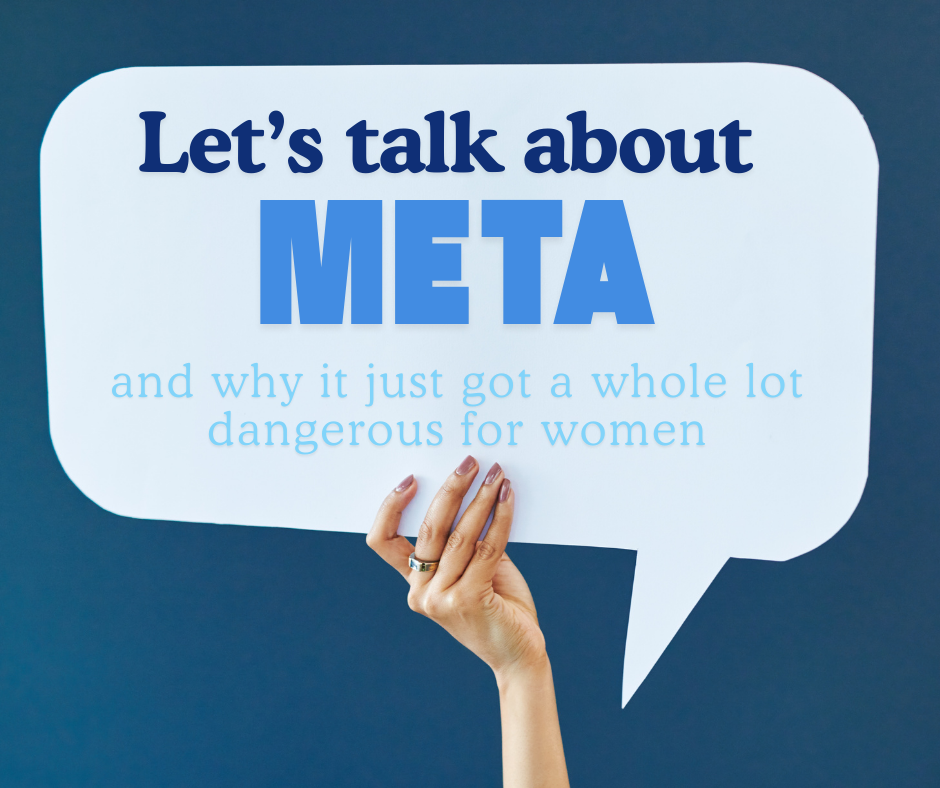My feelings about Meta are complicated. Like most people I have invested a significant amount of time in it’s platforms over the years, not to mention sharing countless photos and memories. With that said, it’s no secret that Meta is dangerous for women and has shown us repeatedly that it’s more interested in growth than accountability. Maya’s Angelou’s famous words “when someone shows you who they are, believe them the first time” also applies to corporations.

From its role in spreading misinformation during critical elections to the troubling way it handles artificial intelligence, Meta’s actions this week continue to create unsafe spaces for women, particularly those from marginalized communities. Collectively and individually, we should be having meaningful conversations about how to move forward in light of recent changes. While some may be able to simply extricate themselves and walk away, for others, it’s far more complicated. This includes those running businesses or individuals with limited mobility who might otherwise feel isolated. Social media’s grip on our lives isn’t something we can entirely escape, but there are steps we can take. It begins with understanding what happened this week.
The Dangers Meta Poses to Women and Marginalized Groups
Misinformation That Hurts Women
Meta’s platforms, especially Facebook and Instagram, have been cesspools for misinformation. From anti-vaccine propaganda to conspiracy theories targeting women’s reproductive rights, these platforms amplify harmful narratives. During the 2016 U.S. presidential election, Russian interference exploited Meta’s algorithms to spread divisive and false information, disproportionately targeting Black women and other marginalized communities. The result? A fractured digital ecosystem where truth takes a back seat.
AI and Bias: A Major Flub
In its latest move to integrate generative AI into its platforms, Meta revealed just how little it understands or cares about marginalized identities. Its AI tools failed to accurately represent Black women, defaulting instead to stereotypes that are not only inaccurate but offensive. This isn’t just a technical oversight it’s a direct result of a bro company culture that doesn’t prioritize diverse perspectives in its development processes.
Targeted Harassment
Meta has long been criticized for its inability (or unwillingness) to address harassment on its platforms. Women who speak out about gender equality, racism, or any number of social issues often find themselves at the receiving end of coordinated harassment campaigns. And Meta’s response? A lacklustre combination of automated tools and limited human oversight that leaves many victims feeling victimized all over again.
Algorithmic Amplification of Harm
Meta’s algorithms are designed to keep users engaged, and outrage is a powerful engagement tool. Content that provokes strong emotional reactions—often anger or fear—is prioritized, meaning misogynistic, racist, and otherwise harmful content gets more visibility. Women and marginalized groups bear the brunt of this, facing not just harassment but also systemic dehumanization as harmful content spreads unchecked.
Enjoying this post? If it made you think, smile, or yell “Yes!” at your screen, consider buying me a coffee. It helps fuel the stories and conversations you find here.

Failure to Protect Privacy
From the Cambridge Analytica scandal to more recent data breaches, Meta has consistently failed to protect user privacy. For women, this can mean something far more dangerous than stolen passwords; it can mean personal safety is at risk. Abusers have used location tags, private messages, and even profile data to stalk, harass, and harm women.
Focus on Profit Over Safety
Ultimately, Meta’s primary goal is profit, not user safety. While it invests heavily in the metaverse and AI, it has repeatedly slashed funding for teams working on moderation and trust issues. This focus on revenue over responsibility makes its platforms inherently unsafe, especially for women who are already more likely to face online abuse.
How to Disentangle Your Life from Meta
Oooh, let me tell you this is a hornet’s nest of a conversation. I opened it up for discussion on Threads (yes, I see the irony), and the responses ranged from downright hostile (which were immediately blocked) to deeply personal. What you choose to do in light of this news is entirely up to you, but if you feel compelled to take action, I’ve listed a few thoughts and steps below.

Step 1: Stop Funding the Machine
If you’re not ready to delete your accounts, at the very least, you may want to consider not paying for verification. That blue checkmark might look appealing, but by making monthly payments, you’re directly supporting a platform run a billionaire. Instead of verification, explore other ways to maintain your credibility or authenticity online that don’t involve contributing to Meta’s monetization strategies. Build your blog, start your newsletter, and consider building communities on alternative platforms like Mighty Network or Discord.

Step 2: Remove Personal Information
Rather than posting new updates, start using your login time to clean up. Dedicate a few minutes each day to delete or download images and posts you’ve shared over the years. You might be surprised at how much of your life is sitting online without a second thought. If you’d like to download all your images at once, that’s totally doable. Hat tip to @ilovechipolte1301 on Tiktok for sharing this easy to follow guide.
Step 3: Pare Down
If you’re like most people, you probably have Meta accounts you barely use, if at all. Instagram, Facebook, WhatsApp, or Threads all fall under the Meta umbrella. Think about deleting the ones you don’t use regularly or at a minimum removing them from your phone. There’s no reason to let your data linger on a platform you’re not even using. And often when apps are on our phones they have permission to pull data from other apps we use unless we’re hyper vigilant with settings.
Step 4: Delete It All
If you’ve had enough of the privacy concerns, the relentless ads, and the manipulative algorithms, the ultimate move is to delete your accounts entirely. Yes, it’s a bold step, but you also might find it incredibly liberating. There’s a world beyond Meta, something I’m going to be consciously reminding myself of a lot in the coming days.
More Reading
Robert Reich shares some alarming insights into Meta here.
What do you think?
I’d love to hear how you plan to manage your time and privacy using Meta products. Drop a comment below to share.
